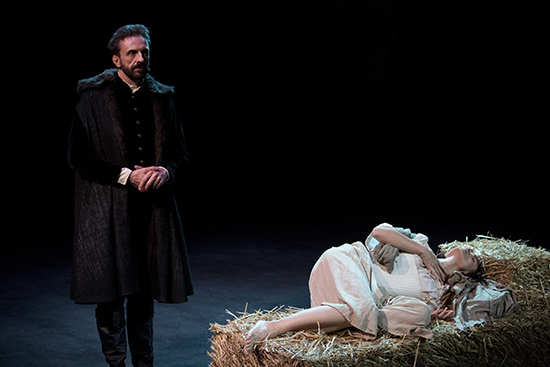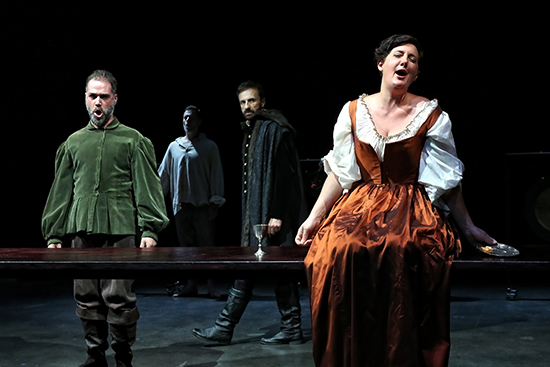More than a bio-opera
Keith Gallasch: Sydney Chamber Opera, Biographica

Biographica, Sydney Chamber Opera
photo Prudence Upton courtesy Sydney Festival 2017
Biographica, Sydney Chamber Opera
One immediately striking thing about Biographica is its spatial inventiveness—Ensemble Offspring occupies half of the stage, the actor-singers the other, the latter sometimes working around the players. Given the Renaissance subject matter of this opera, the close presence of the ensemble offers a period sense of courtly space which we the audience share with the singers.
The other fascinating element of Charles Davis’ design is a ‘widescreen,’ seemingly suspended box-stage at the far end of the space. It’s initially populated with a line of four choral figures (with gongs and drums forecasting the principal character’s death). Internally lit (Davis again), it reaches out emphatically to us, pulling perspective in an era then so preoccupied with it. It also doubles as a screen for a sequence of swirling projections of drawings by the opera’s subject, Gerolamo Cardono (1501-76), of his ideas and inventions, making them appear aptly cosmic (AV design James Brown). Ahead of his time, Cardono could see the microcosm in the macrocosm, a theme wound through the opera. I had high hopes for this added space. It was used again, as in the opening scene, and also for Cardino to madly dash across when in state of high anxiety, but not to its full potential.
There’s no potential lost in the acting and music making. Composer Mary Finsterer and librettist Tom Wright have fashioned an engaging and accessible opera that economically unfolds as Cardono looks back over a life of remarkable achievements which anticipated modern preventative health care, advanced astronomy and computing. Expressions of these are interwoven with Cardono’s guilt about the dark fates of his three children and his anger at the religious repression of science. Expositions of observations and ideas are tautly integrated into the drama. For example, we witness him coolly delineating the progress of plague in the body of his dying daughter, Chiara (Jessica O’Donoghue). The subsequent scene reveals Cardono’s keen desire to educate Chiara, here a child, about the stars. She spins in the light of his projections of the heavens, singing sweetly of a dream to find eternal life in a star. It’s a bitter juxtaposition. One son, Aldo (Andrew Goodwin) becomes a thief, an ear cut off as punishment, the other, Giambattistia (Simon Lobelson), is hanged for murdering his unfaithful wife, Caterina (Anna Fraser). Sadly, pathetically, and angrily, they all in turn and then as ghostly trio berate Cardono, the great scientist, for not being able to foresee their failings and thus save them.

Biographica, Sydney Chamber Opera
photo Prudence Upton courtesy Sydney Festival 2017
Biographica, Sydney Chamber Opera
What gives weight to Mitchell Butel’s intense portrayal of a moody, angry Cardono and makes the work much more than a bio-opera, is his persistent preoccupation with fame and the nature of time, believing, astrologically, that he knows the day he will die. He will not be famous in his own time, but passionately believes the future will acclaim him: his name will spread “like a ripple on a pond and return with a roar!” At the opera’s end, Cardono defies time to what sounds like a grinding funeral march. Further weight is added in the clue to the cause of his emotional distance from his children: his enduring angst about being an unwanted child. This is brutally revealed in the opera’s second scene in which his mother (Jane Sheldon), blaming her yet to be born child for the loss of her others, begs, from a long list, for the means for abortion. From soaring fear to guttural rage, Jane Sheldon sings with frightening power against a contrasting, soft, pulsing score.
Janice Muller’s direction yields strong performances. A head-miked Butel fills the space with psychodrama intensity while all the singers excel vocally. O’Donoghue conveys Chiara’s despair with a chilling sweetness, Goodwin expresses Aldo’s utter fear and pathos (“you could have taught me to love you”) and Lobelson exudes Giambattista’s dangerous strength, fully felt in the raging dialogue with Caterina (a fearless mezzo match for Lobelson’s baritone). Ensemble Offspring, excellent as ever and conducted by Jack Symonds, realise with great finesse Finsterer’s adroitly orchestrated score, its Renaissance underpinnings and operatic drive, and its kinship with Glass, Adams and Nyman, if more economical and varied, and here and there Sondheim in Sweeney Todd mode thanks to a finely calibrated relationship between score and libretto. Another fine premiere from Sydney Chamber Opera, warranting a longer life for both opera and Cardono’s dream of enduring fame.
See also Alistair Noble’s review of Biographica on Partial Durations.
–
Sydney Festival: Sydney Chamber Opera & Ensemble Offspring, Biographica, composer Mary Finsterer, librettist Tom Wright, director Janice Muller, designer Charles Davis, lighting Max Cox, musicians Ensemble Offspring; Carriageworks, Sydney 7-13 Jan
RealTime issue #137 Feb-March 2017






